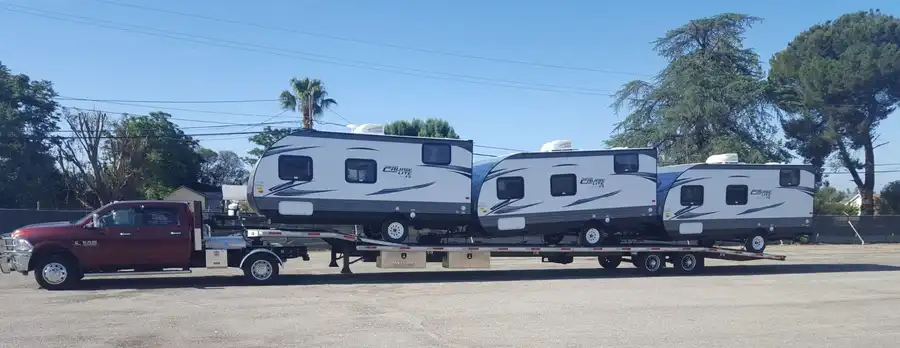Car carrier services play a crucial role in the automotive industry, facilitating the transportation of vehicles across short and long distances. Whether you’re relocating, purchasing a vehicle from another region, or importing a classic car, understanding the factors that affect car carrier service pricing can help you make informed decisions and budget accordingly. This article will delve into the types of car carrier services available, explore the various factors that influence their costs, and provide tips for saving money when selecting a provider.
Types of Car Carrier Services
Open Transportation
Open transportation is the most common and affordable type of car carrier service. It involves shipping vehicles on an open trailer, exposing them to weather elements and road debris. However, it’s a reliable and cost-effective option for standard vehicles.
Enclosed Transportation
Enclosed transportation offers a higher level of protection for your vehicle, as it’s transported within a covered trailer. This method is ideal for luxury, classic, or vintage cars requiring extra care but comes at a higher price compared to open transportation.
Door-to-Door
Door-to-door services provide added convenience by picking up and delivering your vehicle directly from and to your specified locations. While this option can save time and effort, it may increase the overall cost due to the extra resources and planning required by the carrier company.
Expedited Delivery
Expedited delivery guarantees faster transportation for your vehicle. It’s suitable for situations where time is of the essence, such as a last-minute move or a vehicle needed for an event. However, expect to pay a premium for this service due to the prioritized scheduling and resources allocation.
Inventory Relocation
Inventory relocation services cater to businesses that need to transport multiple vehicles, such as dealerships or rental agencies. These services often offer bulk discounts and customized plans.
Auction Delivery
Auction delivery services specialize in transporting vehicles to and from auction houses, ensuring timely and secure delivery for buyers and sellers. Prices may vary based on urgency and vehicle type.
Factors Affecting Car Carrier Service Pricing
Distance and Route
Longer distances, higher costs
The distance your vehicle needs to travel is a primary factor affecting the cost. Longer distances require more fuel, time, and labor, which leads to higher service charges. To save money, consider choosing a nearby pick-up or drop-off location.
Route complexity and accessibility
Carriers determine prices based on the route’s complexity and accessibility. Busy routes with frequent shipments may offer lower prices due to economies of scale. However, rural or hard-to-reach locations can increase costs due to limited accessibility and longer travel times.
Toll roads and fuel prices
Toll roads and varying fuel prices also impact the cost of car carrier services. Some carriers pass these expenses on to customers, making certain routes more expensive. When comparing quotes, inquire about the inclusion of these fees.
Seasonality and Demand
Peak season pricing
Seasonal demand impacts car carrier service pricing. During peak seasons, like summer and holidays, carriers experience higher demand, leading to increased prices. Booking your shipment during these times can result in higher costs.
Off-season discounts
To save money, consider shipping your vehicle during the off-season. Carriers often offer discounts to attract customers during slower periods, allowing you to take advantage of lower prices. However, weather conditions might be less favorable during these times.
Urgency and scheduling
The urgency of your shipment can affect the cost as well. If you require immediate pickup and delivery, you may need to pay a premium for expedited services. Planning your shipment well in advance and being flexible with scheduling can help you secure better rates.
Additional Services and Add-ons
GPS tracking
Some carriers offer GPS tracking services, allowing you to monitor your vehicle’s progress during transportation. While this feature offers peace of mind, it may come with an additional fee. Determine the value of real-time tracking in relation to your budget before opting for this service.
Insurance coverage
Carriers usually provide basic insurance coverage, but you may want to consider purchasing additional coverage for added protection. This extra insurance can increase the overall cost of your shipment, but it can provide valuable peace of mind, especially for high-value vehicles. Discuss available coverage options with your chosen carrier.
Vehicle Type and Size
Larger vehicles, higher costs
The type and size of your vehicle can influence pricing. Larger vehicles, like SUVs or trucks, take up more space on the carrier and may require special equipment, leading to higher charges. Smaller cars typically cost less to transport due to their size and weight.
Special accommodations for luxury or classic cars
Luxury, classic, or vintage cars often need extra care during transportation, such as enclosed carriers or additional protective measures. These specialized services come at a premium, increasing the overall cost compared to standard options.
Vehicle condition
The condition of your vehicle also affects pricing. Inoperable vehicles require special equipment, like a winch, for loading and unloading, which increases the cost. Ensure you inform the carrier of your vehicle’s condition when requesting a quote.
Transport Method
Open vs. enclosed carriers
The choice between open and enclosed carriers can impact your transportation costs. Open carriers are more affordable and widely available but expose vehicles to weather and road debris. Enclosed carriers offer extra protection but come at a higher price. Consider the value and sensitivity of your vehicle when choosing a transport method.
Single-car vs. multi-car trailers
Single-car trailers offer a dedicated space for your vehicle, ensuring timely pickup and delivery. However, they can be more expensive due to the lack of shared costs. Multi-car trailers are cost-effective, as expenses are split among multiple customers, but may have longer delivery times.
Flatbed vs. tow truck
Flatbed trucks carry vehicles on a level platform, minimizing the risk of damage during transportation. Tow trucks, on the other hand, tow vehicles using a dolly system, which can cause wear and tear. Flatbed trucks are typically more expensive but provide better protection for your vehicle.
Pickup and Delivery Options
Door-to-door vs. terminal-to-terminal services
Door-to-door services offer the convenience of picking up and delivering your vehicle directly from and to specified locations. However, these services can be more expensive than terminal-to-terminal options, where you drop off and pick up your vehicle at designated carrier facilities.
Expedited shipping options
Expedited shipping guarantees faster pickup and delivery of your vehicle, which can be crucial in time-sensitive situations. This service requires carriers to prioritize your shipment, often leading to higher costs. Weigh the importance of time against your budget when considering expedited options.
Tips for Saving Money on Car Carrier Services
- Comparing quotes from multiple providers: Gather and compare quotes from various carriers to find the most competitive pricing. Remember to consider factors such as service quality, reputation, and included services in addition to price when making your decision.
- Booking services in advance: Reserve your car carrier service well ahead of time to secure better rates. Last-minute bookings can result in higher costs due to limited availability and the need for expedited services.
- Flexibility with pickup and delivery dates: Being flexible with your pickup and delivery dates can lead to lower costs, as carriers often have fluctuating prices based on demand. Allowing a broader time window for transportation can help you secure better deals.
Understanding the factors that influence car carrier service pricing is essential when choosing the right provider for your needs. By considering these factors and employing cost-saving strategies, you can make an informed decision that balances your requirements, budget, and peace of mind.


